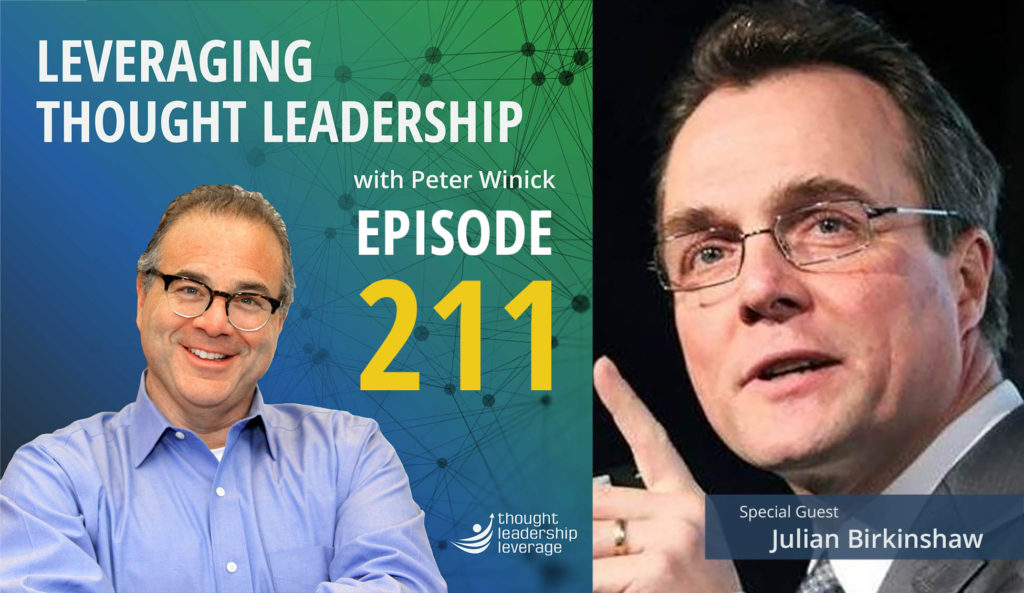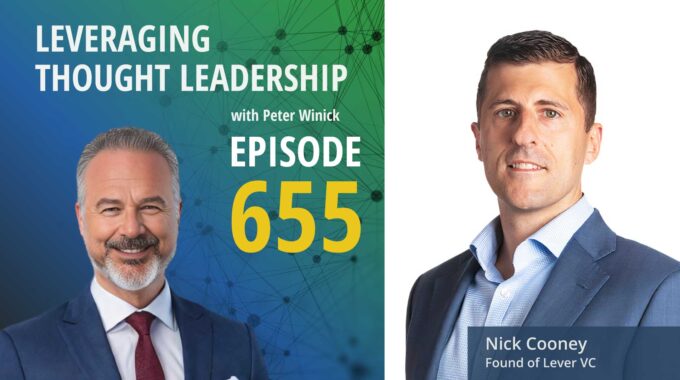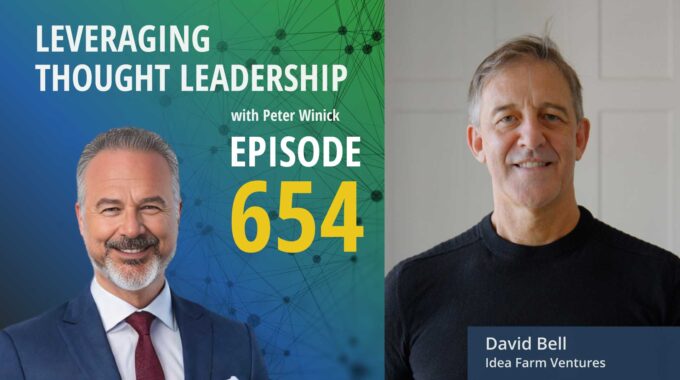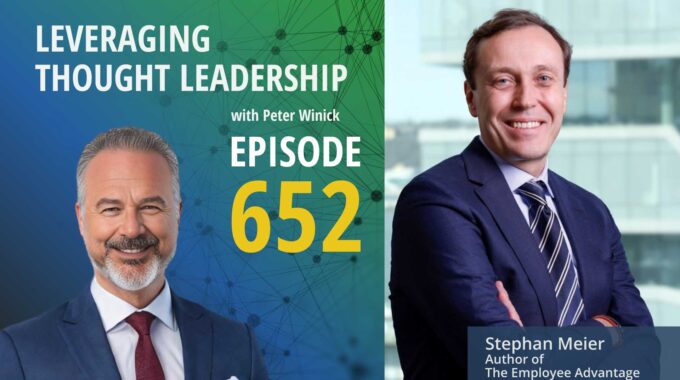How Strategic Content Fuels Growth in Purpose-Led Ventures This episode explores how thought leadership can…
Visionary Thought Leadership Doesn’t Have to Be Impenetrable | Julian Birkinshaw | 211

How to Make Your Visionary Thought Leadership Accessible to Business Today
An interview with Julian Birkinshaw about bringing visionary thought leadership from the academic court to the business world.
We interviewed Julian Birkinshaw, a British academic. He is Professor of Strategy and Entrepreneurship at the London Business School, where he is the Academic Director of the Deloitte Institute of Innovation and Entrepreneurship. He is the author of Reinventing Management: Smarter Choices for Getting Work Done and Becoming a Better Boss: Why Good Management is So Difficult. Listen in as he discusses thought leadership academia, and how to bring your visionary thought leadership to the world in a way that helps others – and makes money!
Three Key Takeaways from the Interview:
- Why academics constantly make the mistake of writing articles that the general business leader just can’t use.
- Where academics make mistakes – and why they can’t recognize a client opportunity even when their visionary thought leadership is pulling people in.
- The difference between using your visionary thought leadership for social interaction, and actually building a business that thrives – and helps others.
Transcript:
Peter And welcome, welcome, welcome, this is Peter Winick, I’m the founder and CEO of Thought Leadership Leverage and you’re joining us today on the podcast, which is Leveraging Thought Leadership. And today my guest is Julian Birkinshaw, who joins us from the other side of the pond, as we say. He’s a professor of strategy and entrepreneurship and the deputy dean of the Executive Education and Digital Learning at the London Business School. He’s a fellow of the British Academy. He’s a p_h_d_ and MBA degrees in business from the Richard Ivey School of Business, Western Canada and the BBC from the University of Durkheim, UK. He’s a recognized thought leader on the impact of digital technology, on strategy and organization of established companies. I could go on and on, but he’s the author of 15 books, including Mine Tools for Managers. He’s part of The Thinkers 50 top top leaders group in the management category. And you could frequently hear him being quoted on the seat on CNN, the BBC, The Economist and others. So welcome aboard. Today, Julian, how are you today?
Julian Birkinshaw I’m pretty good. Thanks, Peter.
Peter Great. So clearly you’re coming at this in terms of, you know, you’re an academic. Correct. And there are lots of academics that are in the thought leadership space. So sort of maybe tell us the story of sort of how those things are connected and where they’re very different in terms of the things that you do as a thought leader versus the things that one typically does as an academic.
Julian Birkinshaw Yeah. I mean, you know full well that academia is all about publishing your academic insights for academic colleagues. And I’ve played that game and I’ve played it successfully for 25 years. But all the way through really from my PhD in Canada, I was never content just to tell a story to, you know, 20 people who happened to be working in my field. It felt that if you’re going to study that topic of management and business, you need to try to influence the practice of management. And so I wrote case studies for my doctoral thesis, whereas most people a huge dataset analysis and those case studies became teaching case studies, my students. And then they quickly became things which found their way into Harvard Business Review type articles. So I’ve always kind of ridden to horses when it comes to doing research to say, is there a story of my academic friends and is there a story that the business world actually cares about? And that’s been the kind of philosophy.
Peter So I want to touch on that for a little bit because we’ve worked over the years, I’ve worked over the years with many academics. Right. And the subset of academics that can actually pull off that crossover into the general thought leadership, general business world are actually quite small. When you when you think about it, there are named Gary Hamos that come to mind these new freedoms, etc. There’s the names that bubble up. But when you look at sort of the total population, the crossover is very, very, very, very small. Right. And I think, you know, you touched on one of the reasons why is, you know, one reason could be some of them are just not interested. They’re doing what they’re doing as professors. That’s cool. But I think the key piece is almost a translation problem of the standards of publishing in academia. Not only is the distribution small, but the way those articles are written are generally unreadable for the general business audience.
Julian Birkinshaw Now, I think it is it is completely impossible for a general businessperson to pick up an academic article on business and get anything out of it. And I think that this is almost by design. You know, academia is this profession where we love the mystery and obfuscation around statistical games and things like that. So that music is a problem. It’s a real problem for the field, right.
Peter Right. So, you’ve been able to crack the code to some degree. I mean, you mentioned case studies speak for a moment, if you would, to the academics or the budding academics, you know, sitting out there and guide them on how to increase their relevance to the general big business on it, because, by the way, that’s where impact happens and dollars happen.
Julian Birkinshaw And absolutely. And for a big chunk of that group, not all but the big chunk. The idea that they might actually impact the world of business in a positive way is something that they chose to do. I mean, they get a little bit socialized into this narrow academic view. Many of them want to do so. What is the code here? It is. I mean, in this sense, it’s going to sound a bit obvious. But part one is you start with a fundamentally interesting business problem, and that sounds obvious. But many academics continue to do narrow kind of building another brick on the wall studies that are interesting in the academic.
Peter So I want to push on that because I think that it’s a bit of stating the obvious, but not quite right. So when choosing research something in academia, it’s almost like the narrow is the better. And you have to find something someone hasn’t quite done before as opposed to asking who cares? Does it needs to be done? Does it need to be done? Who benefits from it? Etc. It’s very much a person introspective. So there’s a bit of navel gazing. And I think what you what you said before is relevant. Why would the business world care about this problem? Forget about. Format, but why is it something they’re struggling with?
Julian Birkinshaw That’s right. And if you was an academic, as a PhD student, let’s say I spend all your time reading the literature you identify as homes in the in the in the body of literature, which are almost by definition incremental improvements. And what’s come before it, however you play. I mean, I’m going to call it an arbitrage game here because it actually set partly in the world of academia. But you also sit partly in the business world. You can kind of go back and forth between the two. You know, I’m seeing this in the real business world in practice, and these ethics aren’t even talking about it. You know that that is the essence of an interesting problem. Right. And so my advice to the budding academic gurus is that they need to get out more. They need to literally go and spend time. And I’m not really working with executives talking about the problems they’re facing and trying to figure out what puzzles that grappling with which the academic literature has kind of ignored.
Peter So I’d love to get your feedback on what I call my Switzerland strategy. Right. So oftentimes what I see in the marketplace is you have, if you think of it on a continuum, academics on one side where the validity of the research and such is done to the 11th decimal point. And you can’t argue with it. Right. They make a solid case. The data is there to support it. Case closed. On the other side of the house, you might have other types of thought leaders. Maybe they come from business or consultancies or whatever, and they’re coming at it from the experiential. Meaning, hey, I know when I do a product launch at a CPG. Because I’ve done it 10 times. These are the five things to look for. Right. And what happens is, instead of trying to help one another in a neutral way, the consultants throw money at the academics and say, yeah, yeah, yeah, that’s all great, the laboratory. But you wouldn’t know a client if they fell in your lap. And the academics, you know, sling the mud back and say, oh, yes, but you know, your theory has no validity because you just pulled it out of your, you know, pick an orifice. Or whatever. So, could you comment on that?
Julian Birkinshaw Yeah. So, they both got a point. And I’ve been part of those conversations many a time. My arms up as it works. The consultancies. Look, you need to be a little bit more cautious or at least disciplined in thinking through what you’re saying and the other one. And I don’t mean that they should become academics. I think what I do mean by that is that it is very easy to generalize from a single example. But very often it’s the case that there is some decently collected evidence out of that which would lead you to a different conclusion. So, I would love our consultant friends to just read a little bit more of this stuff just to make sure that they don’t make silly generalizations. I’ll give you one example.
Peter Yeah.
Julian Birkinshaw What about Generation Y? Right. The millennial generation. Well, you know, it’s actually complete nonsense.
Peter Right.
Julian Birkinshaw To talk about innovation as distinctive from Generation X. And I’m not trying to say there’s no broad things that we could say about it. But to somehow pigeonhole an entire generation as different from Generation X does not stand up to any sort of scientific scrutiny. Now we can identify patterns over time. But it’s a great example where the academic literature, the academics are furious that these consultants who talk about Gen Y as if they are distinct. So that’s one example where not.
Peter That’s a great point. That’s a great point.
Peter Let me ask you to come into this month when I see that problem and my client, whether the client, a consultant or an academic, I actually advise them to say learn from the others if you’re a consultant. And, you know, maybe it’s your intuition, your gut, your life experience, et cetera, that that lead you to believe that X is true. Yeah, that’s great. Then I say, you know what? There’s probably somebody else that study that in academia or elsewhere. Let’s go find some data and attribute to them. So, for example, you know, I’ve had clients come to me, and say “Oh I’ve got this thing.” and it’s like actually that’s called the growth mindset. And there’s Professor Dweck, at Stanford that’s done that. You should read up on hers. A so you don’t sound naive or ignorant and the B attribute to her. Instead of you saying it from ignorance, you say, hey, here’s and then according to the work of Dweck or whoever it is. And then I say the reverse to my academic friends saying, “OK, let’s go find a case study or two in the business world that validates your theories.” And to me, I think you need to be buttoned up on both sides because you never know who you’re talking to on the client side.
Julian Birkinshaw Now, I mean, that guy is completely right. And when whatever your audience, whether you’re a consultant, whether you’re a keynote speaker, there are different ways of convincing people of things. And some people like numerical data and some people like just a just a really neat story. And, you know, the best speakers, the best persuaders have both tools at their disposal. So I’m completely in agreement on this. It’s but it’s a tough act. And to go back to one of your earlier questions, you know, what’s the advice? I mean. The skills of writing, let alone speaking, writing to these two different audiences are extremely different and you have to you have to build a certain NBA dexterity if you if you don’t mind that expression, just Ms. Just being able to write in these two completely different ways.
Peter Yeah. And communicate to the different audiences, you know. Cool. I want to talk for a moment, if we could, about publishing. Yeah, right. So you’re given life. I think I’d be remiss if I didn’t given you’ve written fifteen books as well as been in a lot of short form. Tell me what your thinking or strategy is for publishing it again, not academic. We’re talking more sort of thought leadership to get into the into the quote broader world. The real world.
Julian Birkinshaw Indeed. And for me as a as an academic. You know, Harvard Business Review is still of course, we want the outcomes to come up. And we also think that Sloan Management Review happened, single California management review, which are in a more kind of crossover. Well. I mean, I’ve published in Harvard Business Review, I guess, half a dozen times. I mean, what they what they’re looking for, as I think you know for well, is they’re looking for that dash of insight. This, as you know, everyone else. So you know that the sky was blue and in fact, the sky is green. And it was my little piece of evidence and a couple of nice stories to persuade you of that. And I’ve I probably submitted 20, 30 sort of proposals to Harvard over the year. They reject three quarters of them. I’m kind of cool with that. And I’m just always looking for a fresh angle. Right. I mean, that’s you know, I knew that the underlying research I’m doing is sound. I know I’m writing interesting stories about what I’m doing. And you’re just trying on, you know, different angles with them all the time. So, I wrote the thing on learning from failure. Right. I mean, everybody says you’ve got to if you want innovation, you’ve got to get more serious about tolerating failure. And they soundly rejected my original proposition because everybody else rigidly said that. And then at some point in the conversation with them, we came up with this notion of what we call a return on failure, a ratio, if you like, the benefits of failure and the costs of failure.
Peter Right. Just a bit a bit of a different angle.
Julian Birkinshaw It’s nothing more than a new angle on an old problem, which just gave us a little bit of a wedge to get some other case studies and stories and ideas across.
Peter So you’d say based on your experience, because there’s sort of a I wouldn’t call it a formula. But, you know, we know the attributes, the things that Harvard Business Review as an example, is looking for. It’s there’s got to be data, etc. And given that you’ve got a fairly good batting average. Right. Any trend or anything non-obvious that bubbles to the top of, hey, this, you know, five or six or seven or whatever that I got published? There seems to be a common something. Or is it luck and charm?
Julian Birkinshaw I mean, one luck and tenacity for sure. I mean, the one I just mentioned was actually officially rejected at least twice before we tried to open the door a third time. Now, look, I think if you can’t express your idea in a paragraph. I mean, ideally in a couple of sentences, but in a single paragraph, then I think you’re dead. Because the thing to remember with HBR, is that even when you’ve got a relationship with them, they’re reading dozens of proposals every year. Of course, every day. And they simply are looking for a reason to eject and notice. You can’t remain in that first couple of sentences of the proposition, then you haven’t got a hope. And of course, the other thing that they’re then looking for is, is real evidence that there’s a story that, in other words, they don’t just want a neat idea. They want at least one example or pretty solid body of data that says that there’s some truth behind that. So those are the two tips that they always give to my friends who say they want to publish in Harvard Business Review.
Peter Excellent. So I want to switch now, if we if we could for a moment to sort of the third leg in the stool of Julian in which is the consulting work that you do with real companies. It’s so hard to tell. Tell me a little bit. Not so much the type of work, but how does an academic find the consulting work? What are the types of consulting engagements that you’re looking for and how do they how did they come to pass?
Julian Birkinshaw Yeah, I mean this the bread and butter, we call it consulting, but it’s actually executive education, the bread and butter workers. I will go in and spend a day with a senior team or a group of high potentials and we work through a set of materials. And it’s and it’s often badged as executive training or development and a fulfilling interesting stuff. But that is a very different category than the what I would call real consulting, which is company says, you know, we’ve got up, we’ve got a problem that we’re working on and we. Want you to help us with it. And frankly, in those latter situations, you know, what I’ll typically do is I will act as an adviser to a senior group. So, I’m not going to name the company.
Peter Sure.
Julian Birkinshaw You in a very large health care provider in Europe and one of the biggest companies in Europe. I sat on that advisory group for that entire sort of innovation process. And for about two years, I would go over there every three or four months and I would sometimes give them some ideas and sometimes I would sort of help them review what progress they’d be making in Ice Age. You want to move this a little bit more vast, asking you missing that opportunity. And, of course, that sort of advice, the opportunities are very socially fulfilling because, you know, you can see that you’re really making a difference. But the flip side of it, of course, is that it’s a much bigger time commitment than a lot of academics are prepared to make. And, you know, I guess, you know, thinking it through the third model is and many of my colleagues have done this, is you actually set up a company on the side. And you then hire a professional colleague who’s then doing the kind of the leave that it’s not just me. And I’ve chosen not to do that. Building a company is a lot of work.
Peter So I want to play back something you said, because I it’s a little bit different than what I typically hear is the way you sort of responded was, yes, there’s this bucket of work that’s really consulting work. And then, you know, from there you can choose who you want to do all the heavy lifting yourself or partner with others, because there’s you know, there’s a cadence that that that’s fairly quick relative to academia. There’s your decks and deliverables and a lot of work. Right. And then the other piece, which I don’t hear much in and which is really interesting is, you know, they’re calling it executive education coaching. You know, at the at the root of it, an academic is a teacher. Right. And I think often they’re not selling themselves or positioning themselves into the corporate world to teach their people. Right. So, if you’re if you’re at London Business School, one of the top business schools in Europe. Yeah. And you’ve got a top leadership team. Why wouldn’t I want the best from the best to teach my people X, Y or Z? Right. And I that’s really interesting to me. I mean, it might seem obvious, but I.
Julian Birkinshaw No, it’s a good point, because you know what? What if I spent the last 25 years of my life doing? It is becoming extremely accomplished, if you like, at teaching about taking a group of people on a journey. Sometimes it’s a half day, sometimes it’s to a whole week to embed a set of principles and to figure out how to learn how to do something differently as a result. And that’s a particular skill set which, you know, even a lot of consultants don’t completely master. So I do sometimes wonder we sell ourselves a little bit short because, you know, a company will bring us in to do executive education. You know, they bring McKinsey into do a transformation program and they charge shirkers charges ten times as much as we do. Right. And we haven’t been quite as smart, I think, as we could have been about figuring out the real value that we provide to companies in that respect.
Peter Right. So just being able to go with them and seeing just on the teaching side is an interesting way in the door. And then, you know, then, you know, to your point on the consulting side. Yes. People underestimate how much work is of being a consultant. But I think the key point there is you need to decide as the provider which of that how much of that work do you want to do? Right. I mean, some models are the academic, you know, sort of the rock-star brings in the business and does the client management. But others underneath them are following a framework or methodology that’s pretty solid. And the academics not really doing a lot of the heavy lifting. They’re guiding there would be acting as a senior client engagement manager or something in the McKinsey world. Yeah. Interesting. All right. As we as we start to wrap up your delays, as we can go for hours, because this is a lot of lot of fun, but a lot of insight here. Any final words or thoughts based on what you’re doing? Because, you know, needless to say, it’s working both on the academic side and on the corporate side. Any final reflections?
Julian Birkinshaw I think that the final perfectionism and very personal thing is it, you know, trying to continue to ride both horses is hugely difficult. And, you know, I’ve seen many my colleagues. Gary Hamlin is one of those people. He’s one of mine. You know, Gary stopped publishing SABC academic articles quite a while ago. Right. I mean, he’s still very well out in the academic world, but he’s now firmly in the world of consulting and thought leadership. And for me, the challenge, the opportunity cost, if you like, of staying within the academic writing community is huge. And, you know, and I’ve managed to kind of stay on both sides. Up until now, I can see already I can see that I’m heading, shall we say, the Gary Hamel roots in the last year of my career, because it’s just almost impossible to do those things. In fact, you’d be struggling to find know more than about two or three people on the 50 list who are still publishing proper academic articles, and that’s just based on the demands of what that, you know, if you if you’re committed fifteen hundred hours of you here do that.
Peter There’s not a lot left. Nice. Yeah. Well, this has been this has been great. I appreciate your time and your candor. And I think there was a lot of amazing insights for people on both sides of the House, because at the end of the day, it’s when we bring it all together that that the most powerful results happen. So thank you so much for joining us, Julian.
Julian Birkinshaw You must welcome. Thanks very much.
There can be a big difference between academics and consultants. Do you know the difference between Thought Leaders and Philosophers?
[/vc_column_text][/vc_column][/vc_row]




